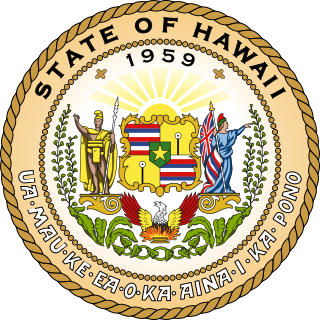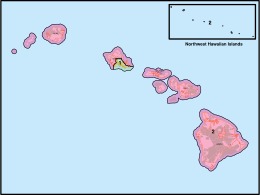
Since Hawaii became a state in 1959, it has sent congressional delegations to the United States Senate and United States House of Representatives. Each state elects two senators to serve for six years. Members of the House of Representatives are elected to two-year terms, one from each of Hawaii's congressional districts. Before becoming a state, the Territory of Hawaii elected a non-voting delegate at-large to Congress from 1900 to 1958.

Edward Espenett Case is an American lawyer and Democratic politician and since 2019 has served as the U.S. representative for Hawaii's 1st congressional district, which covers the urban core of Honolulu. He represented the 2nd district, which covers the rest of the state, from 2002 to 2007.
Hawaii's 2nd congressional district is a congressional district in the U.S. state of Hawaii. It is represented by Jill Tokuda, who succeeded Kai Kahele after the 2022 election. The district encompasses all rural and most suburban areas of Oahu/Honolulu County, as well as the entire state outside of Oahu. It includes the counties of Kauai, Maui, Kalawao, and Hawaii. The district spans 331 miles. The most populous community entirely within the district is Hilo. Major segments of the economy include tourism, ranching, and agriculture.

Charles Kong Djou is an American politician who served as U.S. representative for Hawaii's 1st congressional district from 2010 to 2011. Appointed by President Joe Biden, Djou currently serves as the Secretary of the American Battle Monuments Commission. A former member of the Republican Party, Djou won his congressional seat in a May 2010 special election. He was defeated in the November general election after the Democratic primary provided a single opponent.

Colleen Wakako Hanabusa is an American lawyer and politician who served as the U.S. representative for Hawaii's 1st congressional district from 2011 to 2015 and again from 2016 to 2019. A member of the Democratic Party, she ran for her party's nomination for governor of Hawaii in 2018, challenging and losing to incumbent and fellow Democrat David Ige.

The 2010 congressional elections in Hawaii was held on November 2, 2010, to determine who was to represent the state of Hawaii in the United States House of Representatives for the 112th Congress from January 2011, until their terms of office expire in January 2013.

The 2010 special election for the 1st congressional district of Hawaii was a special election to the United States House of Representatives that took place to fill the vacancy caused by Representative Neil Abercrombie's resignation on February 28, 2010 to focus on his campaign for Governor of Hawaii in the 2010 gubernatorial election. Abercrombie planned to not run for re-election in 2010, and many of the candidates that were running for his open seat transferred to the special election. The election was held on May 22, 2010 and Republican Charles Djou won, defeating five Democrats, four fellow Republicans, and four Independent candidates. The main reason for his win was because there were two Democratic candidates instead of one, which split the votes, allowing Djou to win, as Hawaii is an overwhelmingly Democratic state. Djou became the first Republican elected to Congress from Hawaii since Pat Saiki in 1988; Djou volunteered on Saiki's 1988 campaign, and Saiki served as Djou's campaign chair in 2010. As of 2022, this was the last time in which a Republican was elected to Congress from Hawaii.

The 2012 United States Senate election in Hawaii took place on November 6, 2012, concurrently with the 2012 U.S. presidential election, as well as other elections to the United States Senate and House of Representatives and various state and local elections. Incumbent Democratic U.S. Senator Daniel Akaka decided to retire, instead of running for re-election to a fourth full term. Democratic Congresswoman Mazie Hirono defeated former Republican Hawaii Governor Linda Lingle, in a rematch of the 2002 Hawaii gubernatorial election. This was the first open Senate seat in the state of Hawaii since 1976.

The 2012 United States House of Representatives elections in Hawaii were held on Tuesday, November 6, 2012 to elect the two U.S. representatives from the state, one from each of the state's two congressional districts. The elections coincided with the elections of other federal and state offices, including a quadrennial presidential election and an election for the United States Senate. Primary elections were held on August 11, 2012.

The 2014 United States Senate special election in Hawaii took place on November 4, 2014, the general Election Day in the United States, concurrently with other elections to the United States Senate in other states as well as elections to the United States House of Representatives and various state and local elections.

The 2014 United States House of Representatives elections in Hawaii were held on Tuesday, November 4, 2014 to elect the two U.S. representatives from the state of Hawaii, one from each of the state's two congressional districts. The elections coincided with the elections of other federal and state offices, including an election for Governor of Hawaii and a special election to the United States Senate.

Donna Mercado Kim is an American Democratic party politician from Hawaii. She is a state senator from Senate District 14 and was President of the Hawaiʻi Senate for almost three years.

Kyle Mark Takai was an American politician from the state of Hawaii who served in the United States House of Representatives, representing Hawaii's 1st congressional district, from 2015 to 2016. He served in the Hawaii House of Representatives from 1994 to 2014.

U.S. Representative Mark Takai, who represented Hawaii's 1st congressional district, died July 20, 2016. A special election was held November 8, 2016. In special elections in Hawaii, all candidates run on one ballot with the highest vote recipient winning regardless of percentage. This is what allowed Charles Djou, a Republican, to win the 2010 special election for this district with 39.4% of the vote when two Democrats took 58.4% of the vote combined. However this special election is held concurrently with the 2016 general election.

The 2018 United States House of Representatives elections in Hawaii were held on Tuesday, November 6, 2018, to elect the two U.S. representatives from the U.S. state of Hawaii; one from each of the state's two congressional districts. Primaries were held on August 11, 2018. The elections and primaries coincided with the elections and primaries of other federal and state offices.

Kaialiʻi Kahele is an American politician, educator, and commercial pilot who served as the U.S. representative for Hawaii's 2nd congressional district from 2021 to 2023. From 2016 to 2020, he served in the Hawaii Senate from the 1st district. Kahele is a member of the Democratic Party and the son of the late Hawaii Senate member Gil Kahele.

The 2020 United States House of Representatives elections in Hawaii was held on November 3, 2020, to elect the two U.S. representatives from the state of Hawaii, one from each of the state's two congressional districts. The elections coincided with the 2020 U.S. presidential election, as well as other elections to the House of Representatives, elections to the United States Senate and various state and local elections. The state's primary elections were held on August 8, 2020.

The 2022 Hawaii gubernatorial election took place on November 8, 2022, to elect the next governor of Hawaii. Incumbent Democratic Governor David Ige was term-limited and ineligible to run for a third term. Incumbent lieutenant governor Josh Green was the Democratic nominee, and faced former lieutenant governor Duke Aiona, the Republican nominee. This marked the third time Aiona had been the Republican gubernatorial nominee, having previously run unsuccessfully in 2010 and 2014. Green won the election with 63.2% of the vote with Aiona receiving 36.8% of the vote.

The 2020 Honolulu mayoral election determined the Mayor of the City and County of Honolulu for the term commencing in January 2021. Incumbent mayor Kirk Caldwell is ineligible to run for a third term due to term limits.

The 2022 United States House of Representatives elections in Hawaii were held on November 8, 2022, to elect the two U.S. representatives from the state of Hawaii, one from each of the state's two congressional districts. The elections coincided with other elections to the House of Representatives, elections to the United States Senate and various state and local elections.




























